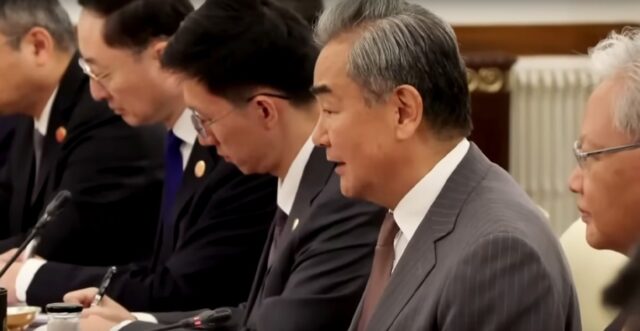From New Delhi, Chinese Foreign Minister Wang Yi is set to travel to Islamabad on August 21. The timing and sequencing of this visit has generated fresh debate over Beijing’s intent and sincerity in recalibrating ties with India.
Wang, who’s now on a three-day visit to India, has met External Affairs Minister S. Jaishankar and National Security Adviser Ajit Doval. The two sides discussed border disengagement, restoring diplomatic normalcy and economic cooperation, including lifting of Chinese export curbs on fertilisers, rare earths and infrastructure machinery.
Wang Yi’s Agenda In Islamabad
Wang’s two-day visit to Pakistan at the invitation of Deputy PM and Foreign Minister Mohammad Ishaq Dar is part of what both nations call “regular high-level exchanges”. According to Pakistan’s Ministry of Foreign Affairs, Wang will
- Co-chair the sixth Pakistan-China Strategic Dialogue
- Hold talks with Pakistan’s civilian and military leadership
- Review progress on the China-Pakistan Economic Corridor (CPEC)
- Discuss regional security, economic cooperation and bilateral relations
Preparations for Pakistani PM Shehbaz Sharif’s visit to China, slated for August 31 to attend the Shanghai Cooperation Organisation (SCO) Summit, will also be on the agenda.
Timing Raises Eyebrows In New Delhi
Wang Yi’s visit to Pakistan comes soon after his discussions in India aimed at mending strained ties post-Galwan. While Indian officials have welcomed recent Chinese statements on border stability and economic cooperation, Wang heading straight to Islamabad from New Delhi makes for bad optics.
Observers believe Beijing engaging India on one hand while reaffirming strategic alignment with Pakistan on the other sends confusing signals about its commitment to meaningful normalisation of ties with India.
Balancing Act Or Diplomatic Tightrope?
Chinese officials may argue that Wang’s visit reflects Beijing’s broader strategy of regional balance, engaging both South Asian neighbours as part of its multilateral agenda. However, India has long viewed China’s close ties with Pakistan, especially around projects like CPEC, which run through disputed territory, as fundamentally incompatible with a neutral stance.
Moreover, this trip comes amid renewed India-Pakistan tension over the Pahalgam terrorist attack in April and India’s subsequent military response—Operation Sindoor. That flare-up renewed concerns in New Delhi about Pakistan’s military posture and China’s silent support, through economic and security cooperation.
The Strategic Backdrop
The back-to-back visits by Wang Yi also play into wider geopolitical dynamics:
- CPEC remains a cornerstone of China’s Belt and Road Initiative. Beijing is keen on expanding it to new areas, including energy, logistics and defence technology.
- Pakistan’s economic dependence on China has deepened post-Covid. Wang’s visit is expected to give new financial assurances.
- With U.S.-China tensions escalating, especially over trade and Indo-Pacific alignments, Beijing appears to be shoring up its regional alliances ahead of the SCO summit, where both India and Pakistan will be at the table.
For New Delhi, the message is clear: While talks with Beijing on trade and border stability are welcome, any meaningful improvement in ties must be matched by actions, not optics.





